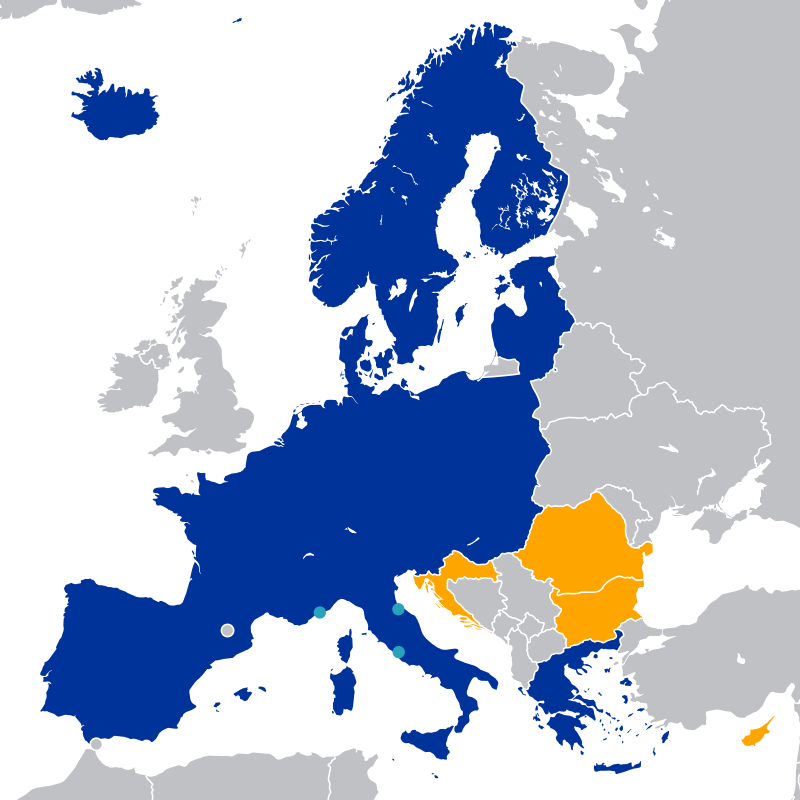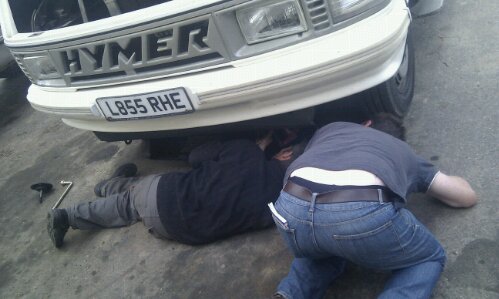The Death of the Year Long Motorhome Tour of Europe?
Last updated 12 January 2020.
Up until now, Ju and I have enjoyed what was, unbeknownst to us, a level of European motorhome touring freedom which is about to end. We’ve been lucky enough to spend years touring the continent, with the only restriction on our movement being the need to come back to the UK for a yearly MOT. Once the UK leaves the EU (Brexit), that freedom will come to an end, and future year-long motorhome tours of the continent will have to change for UK citizens.

Eh? What’s Going On?
Brexit will mean our rights to stay in the ‘Schengen Area’ countries across Europe will be curtailed to 90 days in any 180 (described well for non-resident ex-pats in France here). If your motorhome tours in Continental Europe are never for more than 3 months in any 6 months (90 days in a rolling 180 days), you can stop reading now. If, however, you like the idea of roaming about Europe for many months at a time, prick your ears up, you might be in for a shock.
Following on from the UK General Election on 13 Dec 2019, the Conservative Party now has a large majority in government, and it looks very likely that the UK will leave the EU with a withdrawal agreement on 31 Jan 2020. Assuming the withdrawal agreement is in place, then a ‘transition period’ will follow, which will end on either 31 Dec 2020 or potentially as late as 31 Dec 2022 if an extension is agreed (but the UK government is currently adamant the transition period will only be 11 months long). During the transition period all of the EU’s current laws will apply to the UK, and our freedom to travel Europe as EU citizens will continue.
At the end of the transition period, the 90-in-180 day rule will kick in, so probably 1 January 2021. After that point UK citizens will be restricted to 90 in 180 days inside the Schengen Area. There will be some additional changes too around Pet Passports, IDPs, Insurance Green Cards, EHICs and so on. For the latest situation, keep an eye on the government website: www.gov.uk/visit-europe-brexit.
Where’s this Schengen Area Anyway?

This is the Schengen Area map (thanks to wikipedia). The countries in the Schengen Area are in blue, and are currently as follows (Bulgaria, Croatia, Cyprus, and Romania aren’t yet members but are legally obliged to join):
Austria, Belgium, the Czech Republic, Denmark, Estonia, Finland, France, Germany, Greece, Hungary, Iceland, Italy, Latvia, Liechtenstein, Lithuania, Luxembourg, Malta, the Netherlands, Norway, Poland, Portugal, Slovakia, Slovenia, Spain, Sweden and Switzerland.
How Exactly will This Affect Me?
Once Brexit is complete (the transition period is over), the border authorities in the Schengen countries should make a note of when you arrive in the Schengen Area, and when you leave. Their systems should keep a track of how many days you have spent inside the Area, and each time you leave they should check if you’ve exceeded 90 days in the past 180 days. This means you can leave and re-enter the Area as many times as you like, but can’t stay more than roughly 3 months in any 6 months.
What happens if you try and stay longer appears to depend on a mixture of (a) how long you overstayed and (b) the country you were caught in. Deportation, fines and temporary bans on re-entry to the Schengen Area are all possibilities. The Internet being what it is, there are lots of folks who suggest the law isn’t, can’t or won’t be enforced. It seems very likely to us the law isn’t 100% enforced to the letter across all of the Schengen Area, but we’re personally not planning on risking it.
Can’t We Work Around This? Where There’s a Will!
Thankfully Nomadic Matt’s already done the heavy lifting on this one (read his article here, or thesavvybackpacker.com has similar info). In summary:
- Option One: is to leave Schengen before your 90 days are up and wait out the three months in non-Schengen countries. This is the approach our Australian and New Zealand motorhome-dwelling cousins have been using for years while in Europe.
- Option Two: risk staying over 90 days and leave via one of the countries currently known for less stringent border checks. Matt isn’t recommending this one and points to two examples of people having ‘Illegal Immigrant’ stamped in their passports who were caught trying to do this.
- Option Three: get a one to two year working holiday visa for one of the Schengen countries. It’s not clear if this will be possible for UK citizens post-Brexit, and Matt’s article states you normally need to be under 30 or 35 years old for these visas.
- Option Four: apply for a long-term stay visa in a Schengen country. Looking at France’s visa website, this appears possible for tourism reasons, although the site points out “the long-stay visa is equivalent to a Schengen visa, enabling you to move around and stay in the Schengen Area outside France for periods not exceeding 90 days over any period of 180 consecutive days, under the same conditions as if you held a Schengen visa. ” So although this might be hard to enforce, even if you can get this visa for a full 12 months in France, it doesn’t entitle you to drive around the other Schengen countries for more than 90 days.
- Option Five: get a student visa. Matt’s article references folks paying for a year long course to study Spanish, say, which will grant them a full 12 month visa. France’s visa website indicates the same 90 day in 180 limit applies for student visas.
- Option Six: get a freelancer visa. If you’re working on the road, some countries like Germany will issue a visa under some circumstances. This looks like a potential option, but with lots of red tape and again may only legally allow 90 days in the other Schengen countries – this isn’t clear to me.
The final option Matt suggests is to get married to someone from a Schengen Area country! While definitely a possibility, this seems a little extreme, and since Ju and I are already married, not an option for us personally! There are a couple more options worth considering:
- Option Seven: get an EU passport. This is only a goer for those with parents or grandparents born in the EU (read more here), which might allow you to apply for dual nationality. We have Australian friends with family from Malta who have done this, and are able to roam Europe as EU citizens can.
- Option Eight: Become an EU resident (for residency info on France, check this site out). This really isn’t something we’ve put much thought into, as it would require us to shift our entire life outside the UK: where we pay tax, what health care we have access to, our home and so on.
Matt’s article concludes with this paragraph, which just about sums up the situation I think: it is possible to stay in the Schengen Area longer than 90 days, but you’ll have to be prepared to either (a) take a risk on being caught overstaying your 90 in 180 days or (b) understand and work the visa system:
” In the end, it’s not impossible to stay long-term in the Schengen Area. By working the system a bit and using the few loopholes that do exist, one can legally stay past 90 days and enjoy all Europe has to offer without worrying about being barred for life. “
What’s ETIAS?
ETIAS is the European Travel Information and Authorization System (read more about it here). By 2020 UK residents will need to register with this system before travelling to the Schengen Area. It’s not a visa, nor is it directly related to the Schengen 90 day rule, but could be used to better enforce it. It’ll cost €7 per person, and each application (if successful) will last for three years. So it doesn’t help get around the 90/180 rule.
So, Is the Year-Long Tour Dead?
Without beating around the bush: it looks that way, yes, the year-long motorhome tour as we know it is soon to be dead. At least without doing a bunch of work to get a long-term visa for staying in one country, and even then you’ll have to accept the risk you’re breaking the terms of the visa if you travel across multiple countries for too many days at a time.
The tours we’ve completed, the example year-long tours we’ve given in The Motorhome Touring Handbook, and most of those multi-month tours completed by other UK-based motorhome bloggers won’t be (easily) possible for UK citizens post-Brexit. The approach we guess most folks will take will be to shift to shorter tours, with some people making use of countries like Morocco (easily possible in a motorhome), UK , Eire, Croatia and Turkey to wait out the months (or storing the van and flying out of Schengen – but your motorhome insurance will probably not apply while you’re away) until the clock resets and they’re able to legally re-enter the Area.
To tour for a full year in the van in this way would require spending 6 from 12 months in a relatively small number of countries though, which is a fairly hefty restriction when there are 26 countries to explore in the Schengen Area.
If you spot anything incorrect in this article, or you know of any options for avoiding the 90 day rule, please comment below, we’d love to hear from you. Please include a link to the source of information, so anyone reading your comment can assess how viable it is for each of us.
Cheers, Jay










Thanks for this useful post and the options. It will mess up your plans and those of many others. We don’t tend to spend more than three months away at any time at the moment but do tend to make two month long tours in spring and autumn and even this will now be complicated. Previously we haven’t had three months back home in the UK between these trips, as we haven’t had to, but the dates we can travel and return will be seriously curtailed from now on.
Hi Carol,
That’s what we do too – a pair of two-ish month trips, spring and autumn. We think we’ll be able to continue by making sure the 180 day period for our spring break _finishes_ early enough in summer to allow us to start our autumn tour on time.
For example, if our first visit of the year to the Schengen area was end of March – when we normally start our spring tour – then the 180 day visa period which started then would end roughly end of September. That would be a problem since we normally start our autumn tour end of August, since November can be a bit dismal anywhere.
The solution is to make sure we visit a Schengen country mid February every year, even if just for a day. Mid February is after the end of the 180 day visa period starting end August (start of our tour), and so will start a new visa period, one which will end mid August before our next autumn tour.
We think (ok, hope!) this will work, and in practice be simpler than it sounds, but I think we’re all going to be keeping Schengen visa dates in our diaries shortly :(
James & Soo
Hi James & Soo,
Not sure if I’ve completely missed something or not but I think you will be alright with your normal plans if you stick to an initial 2 month tour or there about.
You can still leave for example mid-March and return mid-May = 60 days. Wait 3 months = 90 days, then leave again to tour in mid-August. By mid-September you will have used your 90 days in 180 but the clock will then reset allowing you to return mid-October or later if you wanted to extend things by a bit (up to around mid-November).
If during one of your tours (ie. the 60 days one) you popped over the border to a non-schengen country for 3 days, you would probably need to get your passport stamped on entry and exit. But then you could add 3 days onto the tour when you return to schengen countries, making it ie. 63 days total.
Count your days carefully allowing for the months that have 31 days and you probably have to also include arrival and departure days in the count etc. I hope this all makes sense and I’ve explained it well. Please verify this for yourselves though as I’m far from an expert.
Goodluck with your plans and your travels,
Marena
There is one other potential solution ( except for cancelling the madness that is Brexit altogether). The EU has launched a petition of concern that will give EU citizenship to U.K. nationals irrespective of Brexit. To achieve this we need to get 1milliion signatures on the petition.
Link here.
https://eci.ec.europa.eu/002/public/#/initiative
Thanks Andy. Sounds really strange that we as citizens could have EU membership rights without our nation being a member of the EU? I’m utterly confused how that would work? Jay
Hi
I did not know you could get a what you call A EU citizenship I all ways thought you became a citizen of tbe country that you wanted to live and work in
That’s my understanding too Les.
Any news on this, I got a few people to sign this but as yet I’ve heard nothing on its progress. In between motorhomes but hoping to evade the British winter, longer if possible
Hi link doesn’t appear to be working
Hi Ian – I’m guessing it’s the Nomadic Matt link which was broken? Here’s the fixed link: https://www.nomadicmatt.com/travel-blogs/how-to-legally-stay-in-europe-for-more-than-90-days/
Cheers, Jay
“The final option Matt suggests is to get married to someone from a Schengen Area country” Can you explain how this would help? Does that someone have to live in a Schengen country or just have a passport issued by a Schegen country? My wife has a French passport but lives in the UK, would this allow me to travel with her as we do now, 9 months a time out of the UK in mainland Europe, after the Brexit process? Thanks for your help in advance. Just booked our Tunnel crossing for the beginning of March and don’t intend returning till mid September.
Hi Kev, short answer: I don’t know. My guess is you’ll be able to travel freely as French (and therefore EU) citizens, but you’d need to ask someone with authority. Good luck, cheers, Jay
Cheers Jason, it’s all bit up in the air isn’t it. I have a feeling we’ll just wing it and see what happens :) . Hope to bump into you one day while traveling.
Hi Kev
I am in the same position as you. Recently I sent an email to the EU Commission and asked this question. The response was quite clear, Catherine (with a French passport) will be fine. I do not get her privileges though. So we are trapped. Grr!
Hi Kev and Richard
I have good news for you. I am a dual NZ/Irish citizen and did a lot of research before starting our full time tour 18 months ago with my NZ wife. There was a lot of misleading and incorrect information handed out to me by various embassies but after a lot of work I was able to reach the firm conclusion that as long as either you or your wife are EU citizens, you both enjoy the same freedom of movement, provided the non-EU spouse is travelling with, or travelling to meet the EU spouse. The same goes for dependent children. The defining document is the EU Directive 2004/38/EC and one of the principles is that there is no point in an EU citizen having the freedom of movement if their family doesn’t. Therefore one of the keys of this Directive is that it lays out the rights of the non-EU family members to freedom of movement. You can travel to any EU state for any purpose for up to three months with no administrative procedures required, then go to another EU state for three months and so on. If you wanted to stay more than three months then the non-EU spouse is supposed to register with the police apparently.
We have now been travelling for 18 months, mainly within Schengen but also going outside on occasions without problems at the borders. I have put the results of my research, including copies of emails I received and full copies of the relevant EU legislation into a Blog post. http://travel-cook-eat.com/schengen-rules/.
Jason’s post is excellent, well researched, timely and as far as I can tell, correct. I personally feel so sad that UK citizens are going to be denied the opportunity to roam freely and only hope that there are some real benefits from leaving to make up for what is being lost – because you are all losing a lot. We are parked up beside a lot of great UK people in Spain tonight and none of them really seem to appreciate what is just around the corner and how it will impact them. Our neighbour believes that because he owns property in Spain, that he will have the right to be in Spain for as long as he likes.
Remember Iceland, Norway, Switzerland and Liechtenstein have joined the Schengen Area and are non EU countries. . . It would be silly for the UK to stay out of it as well, regardless of how we exit the EU.
Also, consider those from the EU who are touring the UK. Would we restrict them to the dame rules? Nothing has been said but again, it the only reason to change the current status would be to (ahem) try to make the transition out of the EU as difficult as possible in al its minor details to get us back in again as soon as possible.
So much of this is like the YK2 scare stories.
Hmmm, as I understand Schengen it means (usually) borderless entry? The idea the UK would leave the EU to get control over our borders, then sign up to Schengen afterwards, opening them straight back up again, seems very unlikely? Cheers, Jay
As we’ve objected to joining Schengen while we were in the EU, and it’s essential nature is free movement of people, there’s basically no chance we’ll join when we’re out. And TBH, I don’t think the EU Would be too keen either – it needs a certain amount of trust that your Schengen partners are showing a certain level of responsibility in their border control.
And we are not already showing a certain level of responsibility? Every time I go in and out of the UK I go through passport control. . . If I go from, say, Spain to France there is none.
Hi Jay
I know there are a lot of unanswered questions regarding this topic, but thank you so much for trying to clarify things for those of us that are struggling with understanding what we could and could not do – potentially. From my understanding of what you’ve suggested do you believe the following would be possible?
Spend 90 days in the Schengen area and then say cross into Morocco on the 90th day. Spend 90 days in North Africa and then still be able to cross back into Spain and spend another 90 days in the Schengen area. Thus giving a total tour time of 9 months.
Asking for a friend :-)))
Cheers
Nick
Yup, that would work. Cheers, Jay
This was my plan too. Autumn down through France, Spain and Portugal. Winter in Morocco. Spring through France, maybe Italy or Germany. Then summer in the UK or Ireland. This would be very good for Moroccan and British tourism and very bad for European tourism. It’s in their interests to not restrict us to only 90 days.
Thanks Jay
I believe there’s a good book out there somewhere about touring Morocco. May have to invest in a copy.
Cheers
Nick
You’re writing like a bona fide journalist Jay!
The only factor you’ve omitted, specific to a UK motorhomer, is vehicle insurance. So the options for getting around the 90 day Schengen rule are as maybe (without considering a UK motorhome) but UK insurers will not offer EU policies that extend the 90 day rule. So even if I get my Belgian passport it won’t make any difference by the time Safeguard have ceased my EU365 policy and applied the 90/180 rule, which they will have to as EU-wide “equivalences” will cease for UK services unless there is a deal & transition period.
Only if I move my MH to Belgium and get Belgian insurance will my year-long perambulations be possible again…. Fingers crossed Brexit will go up in flames and all this becomes moot!
Regards to you and Julie, Dave in the Frankia (Diamant Vert, Fes 2017)
Thanks for that Dave, great point, hadn’t spotted that one… Nice to hear from you again, cheers, Jay
Why don’t we just wait and see. Personally I think the whole brexit thing has become a magnet for scaremongering
Hi Dave. I’m not trying to scare anyone – I really have nothing to gain in doing that. As far as I can tell, assuming Brexit takes place the 90 day rule WILL be applied to UK citizens (if you have alternative information, add a link to it, pls share it with us). If there’s a transition period then some folks who want to do a long term tour will still have the opportunity to do so. The point of articles like this are to inform so those folks have a chance to do at least some of what we did (and to check my facts by putting them into the public domain). Jay
This isn’t scaremongering, it is already the official position in all EU countries (yes that includes the UK) although not strictly enforced. The difference being on 30 March 2019 is that the UK will no longer be an EU member, deal or no deal and therefore a 3rd country, where immigration rules WILL be enforced and UK citizens will be under scrutiny when travelling the EU. This effectively means that it will not be possible to stay more than 90 days in 180 because of border controls on UK citizens. Just one correction in the blog. These rules apply from 30 March 2019 even with a deal. Great explanation of what happens though. Thank you.
Thanks Peter, I’ll amend that part of the post. Jay
Thanks for the informative post. The 90 day rule does indeed have an impact on our travels as we are normally away for at least 4 months in one go. Anna, my wife is Maltese and my father is Irish so I am lucky that I have a fall back. Your post has now got me ready to apply for either passport—Irish is cheaper.
Look forward to reading your next travel updates…be safe.
Peter
Hello Peter
i am not sure if you will see this message, has some time as past, but i would like to know, did you go for your Irish in the end? what was the out come?
Thanks in advance
Hi. I am watching the whole Brexit process very carefully. We have purchased a new M/H VAT free from a UK firm which we will be picking up on 1 May 19. From there our plan was 3.5 months on the continent, I’m on a NZ passport and my wife on a UK passport and both resident in NZ. There is some thought that we would be required to pay the equivalent of VAT sales tax in Europe at the port of entry. I have been trying to establish any truth in this but I think like a lot of Brexit, there is much yet to be decided or released to the public. If so plan B will be a tour of GB, which while wonderful would be the end of 2 years of planning for our european trip.
Hi guys, thanks for the blog. We’ve always held the view of waiting to hear the final outcome before triggering any changes in what we do, although the way you’ve laid out all the info is really helpful. Thank you. Our views haven’t changed although, personally, fulltime travel is now in our blood, if it can’t be in Scoobs around Europe then it’ll morph into something new and create the next chapter of our lives. Everything has a resolution or a problem depending on how it is perceived. I feel excited by how it will unfold and what opportunities it will create for us. All the best to you and Ju. Kx
Hello Jason & Julie
Happy New Year!
Re Iceland, Norway, Switzerland & Liechtenstein, they are not members of the EU, but they have trade agreement
with the EU countries and this because they MUST allow free movement of people (immigrants etc)!
These countries do not have a vote in the EU! A lot of their citizens are not happy about this!
As mentioned earlier the UK insurance companies will of course adhere to the 90 days rule, and most likely
charge for a Green card and the telephone companies will reinstate high roaming charges and the UK
government will do nothing about it.
Safe travels,
Robert
It would be potentially logistically possible to get close to a six month touring opportunity in the EU. The 180 day ‘clock’ starts ticking on the first day you enter the EU, so if you leave the U.K. and enter on day one, spend a week then come back out, you have 83 days remaining. If you then go back into the EU and use the 83 days at the end of the first period of 180 days, leave on day 180, cross into Gibraltar (Perhaps booking into a B&B for one night as it may not be possible for Gibraltar to accommodate the influx of Motorhomes and it would be possible to leave your vehicle just across the frontier in Spain, remembering that it is the individual with the passport not the vehicle) then as you would have left the EU for 24 hours, the following day you could go back in and enjoy another 90 days as the 180 day clock will start ticking again, then do 90 days in Morocco and return and have another 90 days in EU, not perfect but their is the potential that if you plan the logistics their are still possibilities to continue to do extended touring.
Hi, a really useful, if depressing summary of what the future holds for moho wanderers in Europe. I think you are right about people attempting to extend their travels by mixing Schengen and non Schengen areas – I am thinking here of ‘Our Bumble’s’ description last year of ‘maxing-out’ their 90 day visa for Turkey before heading back to Greece. This year we travelled about 5 months in total, but six weeks of that was a road trip in New Zealand using a car and cheap motels. When you read Aussie and American descriptions of their travels it is what they do, I think, mix and match options to juggle the visa restrictions. Sadly, like all regressive policies, the less money people have the more impact it will have. I am thinking here of retired people who are travelling on a small pension, using as much wild camping as possible to maximise their time on the road. Equally we have met younger people taking a 12 month career break, either living on savings or renting out their house to supplement income. For them I think it is ‘the death of year long travel’. Wealthier people will get around it, they always do.
Hi, I know you lost your dear dog last year, just wondering if you have any information on the PPS, as there is so much around, but nothing seems to be going our way with regard to travel with pets after March.
Regards
Richard, Frankie and Jack.
Hi Richard. As far as I know there’s not been an agreement yet on the UK’s status with regards to the pet passport scheme after Brexit. The last I heard the UK planned to keep using the scheme but if the EU (weirdly) makes the UK an unlisted third country you’d need a rabies test and a three month delay before entering the EU (this is all from memory though). Your best bet is to visit your vet, they should be up to speed. Cheers, Jay
On a lighter note, or maybe not, I’m thinking that I wont be able to bring back copious amounts of cheap French wine 😓
We are personally able to stay in Gibraltar for longish periods. However, we would not be able to store our MH in Gib and to date do so across the border in Spain.
Do you know if the 90/180 day rule applies only to people ir would vehicles also be subject to the rule. Thanks
Thank you SO much for writing this. I’ve been saying this for months in the motorhome groups online and people just attack me as a remoaner, or say I’m scaremongering and it will never happen. It already has happened, it’s already in legislation. All these people who think they can retire and travel Europe in a couple of years are going to be sorely disappointed and then suddenly the reality of what they voted for will set in. As time goes on, and all the vote leavers continue to deny all of the downsides will happen, I just get more upset that people didn’t know or understand what they were voting for.
We’ve brought forward our retirement by a couple of years so we can have some time left before the clock runs out, so now it’s just fingers crossed we don’t leave via hard Brexit.
What a terrible loss for us all, people didn’t know how good they had it.
Sadly it seems the 90 day rule kicks in on 29 Mar 2019, regardless of whether there is a hard Brexit or not. I thought the rule wouldn’t be enforced until after any transition period but commenters have since corrected me. If you have any info to the contrary, please do send it over. Jay
Great article, all our research says the same. Except the transition period thing. Everything I have read, including on the EU sites and that French site you link to say the freedom of movement remains until Dec 2020 if there is a deal. That is included in the withdrawal agreement, I think the Independant is out of step on that one. Of course if there is a no deal I agree it ends March 29.
OK, thanks Kate. I’ll try and find a link to an EU website which makes the date clear if there is a transition period. Cheers, Jay
Here you go – this is the EU official statement that say we will be treated like a member state until the end of the transition period – if there is one http://europa.eu/rapid/press-release_MEMO-18-6422_en.htm
And also the BBC news story that says freedom of movement continues during transition. https://www.bbc.co.uk/news/uk-46214526.
Another thing that people need to consider is loss of reciprocal healthcare rights. It doesn’t apply to us as we are not UK residents so don’t have an EHIC and had to buy private health insurance anyway, but for people who rely on EHIC that will probably change.
I think for us we may pursue Spanish residency – as you stated in your article it doesn’t give us freedom of movement in the Schengen, we would still have to adhere to 90/180 for all other Schengen countries but at least we would have free travel in Spain, plus 90 days elsewhere. Probably means we have to rent an apartment and re-register the motorhome to Spanish plates though. Grrrrrrr Brexit!!!!
Perfect, thanks Kate.
Hi Jay
Depressing, and as you say, you are not scaremongering. This is what the legislation has been saying for a while.
Option 8 is the one I am exploring in depth. I am investigating the tax/NIC/pension implications of temporary residence status at the minute. The other, slightly more drastic, option I am very seriously considering is relocating to Helsinki.
Let’s see what the next 82 days reveal.
Kind regards
Jonathan
Many international travellers already have to deal with visas and other travel restrictions. I’d love to spend a couple of years, for example, touring the UK and Europe before I head south and/or east. The ultimate dream, hopefully starting in 2019, is to drive around the world over 5+ years. But as I’m Canadian I’m up against the Schengen Area travel restrictions. So what I plan to do is ship my camper / overlander to a destination in the northern part of Europe and over the following three months work my way to the UK. Canadians can visit the UK up to 6 months, and I don’t see this changing with Brexit. So after at least 3 months exploring the UK, I will then travel south, eventually crossing into Morocco before that 3 months are up. After 3 months of exploring the desert, I’d head north again and head towards eastern Europe as not all countries in eastern Europe are members of the Schengen area and there is much to explore there. After that 3 months outside the Schengen area are up, I could head back into Europe, go east, or head south. It’s a dance.
For me, the bureaucracy is the worst part of travelling internationally. For example, if I decide to travel east from Europe, should everything remain the same, I will need to fly back to Canada for the sole purpose of obtaining a Russian visa. As it stands now, we can only obtain that visa while we are physically in Canada. Other countries have similar restrictions. If after Europe I decide to travel into Africa, I’ll have to fly home to obtain a visa into Ethiopia.
These restrictions mean I don’t get to explore countries and connect with the different cultures as deeply as I’d like to. But it’s all doable while remaining legal. And I think one of the worst things one can do is try to circumvent the legal process. We are guests in these countries and need to respect their customs and regulations. It’s also worth noting that these regulations change often, so while it’s important to plan ahead, perhaps not too far down the road.
For you, I would think (hope?) cooler heads will prevail, and British citizens will eventually gain similar travel privileges enjoyed by citizens of Switzerland, Iceland, Norway. If not, and you wish to travel outside the UK, you too will learn to dance the dance many of us already do. It doesn’t have to mean the end of long motorhome tours.
Your Mileage May Vary,
Robert
Of course, you’ve missed out an option – to do your very best to stop Brexit happening.
Julie and Jason:
There is a lot of excellent material in your post and in the replies you have received.
We would like to contribute to the topic and hope that we can add some value by addressing some of the issues raised in the replies you received.
We are Australian citizens who have just completed a 21 month, 28 country, 60,000km tour of Europe in a Hymer which we bought in the UK and travelled on our Australian passports.
As Australian citizens we were limited to 90 days in the Schengen zone followed by 90 days out of the Schengen zone, before we could legally re-enter the zone again.
We have not heard of “grey nomads” in a motorhome having difficulties in the Schengen zone.
The cases we have heard of where people had trouble were when they entered and or exited not by motorhome ie plane or some other method.
Our comments are based on several years of online research and on the ground experience and suggest that you conduct your own research on the topics.
Our comments to replies are as follows:-
Kev – Marry Someone from a Schengen Country
Only 1 person out of a married couple needs to be a EU national for both partners to travel (together) indefinitely in the Schengen zone.
That person does not need to live in a Schengen country but must have a Schengen compatible passport and both parties can live permanently in another country, outside of the Schengen zone.
David – Insurance policies offered by UK insurers
We don’t believe it is correct that “UK insurers won’t offer policies that extend the 90 day rule”.
We had our Hymer insured by DUI insurance (London) and the premium was expensive, however, we were covered for 365 days/year and with unlimited mileage – something not offered by many UK companies – we are not sure but have heard that Hertz may offer something similar.
We had no claims in those 2 years, however, we know of two Aussie couples who did and they said they were paid in full and in a timely manner.
Frank – VAT free for a UK motorhome purchase
We have assumed the reason you may have opted for a VAT free purchase is because you intend to import the motorhome into New Zealand at the end of your European travels.
NZ laws, we believe, are not as strict as Australian laws as far as importing from the UK is concerned.
The way we understand how the process might work under Australian laws is as follows:-
The vehicle is purchased in the UK VAT free as export is intended.
The purchaser must be in the UK at the time of purchase and remain in possession of the vehicle for a period of 12 months.
The vehicle should be registered in the UK at the time of purchase.
You could then proceed to France or somewhere else in Europe with a UK registered vehicle like any other motorhomer and travel round Europe.
On crossing the channel to France as far as I am aware there is no check as to whether VAT has been paid or not as you are just another motorhomer going to Europe with a UK registered vehicle.
You are not wanting to register the vehicle in Europe, just travel around.
Vehicles can’t be registered in Europe without a resident’s card and they are very hard to get.
Another Option – Bi-lateral Agreements
Australia has bi-lateral agreements in place with several European countries which over-ride Schengen rules, as far as length of stay is concerned.
This means you may be able to lengthen your stay in the Schengen zone.
You should check with your own Department of Foreign Affairs to determine if your country has any bi-lateral agreements in place with Schengen countries.
The countries that Australia has bi-lateral agreements with include the following:-
Austria – Please click here
Belgium – Please click here
Denmark – Please click here
France – Please click here
Germany – Please click here
Netherlands – Please click here
Norway – Please click here
Sweden – Please click here
Dual European Citizenships and Passports
This can be a time consuming and expensive path.
My wife, Krys, was born in Germany to an Austrian mother and a Polish father so around a year before leaving for Europe Krys applied for German citizenship only to be told that because her father was not born in Germany then she did not qualify.
However, they said that if she was born after 1972 or was born out of wedlock then she would qualify – neither was the case so the application was declined.
So Krys then applied for Austrian citizenship as her mother was born there – same result.
Krys then applied for Polish citizenship – this is very complex, time consuming and expensive as all the application forms, and there are many, are in Polish and must be completed in Polish – around eleven months later we left for Europe still with only our Australian passports.
Caution re entering a country using a secondary passport
We have been advised that if we were to enter a country via a passport from another country, ie not our Australian passport, then we would not be able to call on the Australian Government for consular or diplomatic assistance but would need to contact the authorities from the country whose passport we used – this may not be too desirable.
How to buy, register and insure a motorhome in Europe as a non European resident
We found it time consuming and expensive to have to return to the UK to get the motorhome MOT done.
Non European residents can buy, purchase and insure a motorhome in France and avoid the hassles of having to return to the UK for MOTs.
Euro Camping Cars, a Veron France based company offer a fully legal solution for the purchase, registration (in your own name), insurance, secure storage and unrestricted use of motorhomes throughout Europe.
A company structure is used to formalise the arrangements and all the staff involved speak English.
The insurance through AXA is a little different – it is the vehicle that is insured not the driver as such.
The vehicle is insured for travel anywhere in Europe on an unlimited trip basis.
A typical premium (for a vehicle with a value of say €50000) will cost around €700 annually.
The insurance covers any driver (except for hire purposes) and there are no restrictions on age so even at 70 years young you qualify!
Indoor storage is 1.50 Euro/day + TVA
Company registration fees, professional fees payable to the Accountants and other administration costs to establish the company structure (payable directly to a Chartered Account at the outset): €1450.
Vehicle registration fee, approximately: €450 (one off fee, NOT repeated annually).
We have no financial arrangement with Euro Camping Cars – we have only had several email chats with them to enquire as to how their system works as we are interested for ourselves – they have always responded to our emails within 24 hours.
However, some Aussie friends of ours have purchased a Rimor through ECC and are very happy with the arrangements.
Additional information re our Schengen entries and exits
We only entered and exited the Schengen zone a few times, mainly via France, with a few exceptions and only did it by motorhome.
So the authorities only knew when we entered the zone but had no idea where we were once inside the zone, until we exited again.
When crossing “borders” inside the zone in many cases you are not aware that you have gone from one country to another as there are no border checks – sometimes the only way you know is that the language on the road signs changes.
We chose to ignore the Schengen rules, entering France by car ferry in early March 2017 and returning to the UK via the Euro Tunnel for our MOT at the end of November 2017 – a continuous stay of 9 months within the zone.
We then returned to France again by car ferry 5 days later.
We went in and out of the zone a few times during 2018 but only for short periods ie Croatia to Bosnia and back to Croatia and Bulgaria through Romania to Hungary.
We crossed back to the UK again via the Euro Tunnel at the end of November 2018.
The passports were scanned or checked through their online systems or whatever they do and we were not asked any questions whatsoever about where we had travelled or the duration of our stays.
Therefore we can only say that from our experience the rules regarding length of stay maybe in place but they are not being enforced.
We were pulled over by the Police on a German motorway because our bike covers were flapping in the wind – they did not ask to see any documentation at all, neither driver’s licences or passports, wished us a good holiday and off we went again.
Maybe we were just lucky.
We met several Aussie motorhome couples who have been travelling continental, Europe for years and have never been questioned regarding their length of stays in the zone.
We were amazed at how resourceful some people are in extending their stays and trying to get around what appear to be systems with way too much red tape.
The concept of a “United Europe” may or may not be a good one – we have seen many changes since our first visit in 1978, however there is still a long way to go when you consider all the different rules regarding length, height, width, weight, emissions, parking, camping, registration, insurance etc that have to be considered when travelling from one country to another.
The following is a summary regarding currencies, languages and wild camping in some of the European countries – the rules change regularly.
Happy motorhoming
Rob and Krys Henshaw
http://www.aussieeuropeantour.com
Country Currency Language Wild Camping
Austria Euro German, Croatian, Hungarian O/night parking
Belgium Euro Dutch/Flemish, French & German Forbidden
Bulgaria Lev Cyrillic, Bulgarian, Turkish Prohibited but normally accepted
Czech Republic Koruna Czech Not allowed
Croatia Kuna Croatian Forbidden
Denmark Danish Krone Danish, German O/night parking – no camping
Estonia Euro Estonian, Russian, Ukrainian, Finnish Tolerated but ask permission
Finland Euro Finnish, Swedish, Russian Yes in Nat Parks & with permission on private land
France Euro French, French & only French Yes in inland France
Germany Euro German No camping
Greece Euro Greek, Turkish Not officially allowed but it is
Hungary Forint Hungarian, German, Romanian Free o/night not allowed
Italy Euro Italian With permission of Council
Latvia Euro Latvian, Lithuanian, Russian Ask permission from land owner
Lithuania Euro Lithuanian, Polish, Russian Not sure
Luxembourg Euro French, German, Luxembourgish O/night parking or camping – no
Netherlands Euro Dutch, Frisian, English Forbidden
Norway Norwegian Krone Norwegian, Finnish OK – more than 150 metres from nearest house
Poland Zloty Polish Only on private property with owner’s permission
Portugal Euro Portuguese Max 48 hours but not in urban areas
Romania Leu Romanian, Hungarian, German Ok with permission from land owner or Council
Slovakia Euro Slovak, Hungarian Not allowed
Slovenia Euro Slovenian OK but not in Nat Park Triglav
Spain Euro Spanish, Catalan, Galician OK with permission from Council, Med Coast – no
Sweden Swedish Krona Swedish, Finnish Yes but not in private gardens or agricultural land
Switzerland Swiss Franc German, French, Italian, Romansh O/night parking max 15 hrs
Thanks guys, lots of really useful info there. Yep, we’ve met folks who have ignored the 90 day rule over a period of years without consequence, and have read of others who have carefully adhered to the law. One point I’d make is this: up until Brexit takes place few motorhome travellers in Europe will be subject to the 90 day rule. Afterwards many thousands of British motorhome travellers will fall into this category which may (or may not) render comparisons to pre-Brexit law enforcement irrelevant? One thing is certain: I can’t suggest my fellow travellers deliberately break immigration law. I won’t break it, the risk is too high for me. Thanks again for all the info, really appreciated. Cheers, Jay
I am an Australian who is currently in Italy, though only for 7 weeks this time – Roma, west coast (1 week), Sicily (4 weeks), east coast (2 weeks), Milano. We are driving a tax-free leased French Citroen C3 Aircross.
Since we retired 11 years ago we have driven a leased French car from Paris on several 4 month trips with periods outside Schengen to comply with 90 day restriction.
* To Syrian border in Turkey and back
* Through former Yugoslavia into Romania and Bulgaria
* Ireland – twice
* UK – several times
The weblink is from 2012. It describes one of our 4 month trips to Spain with a detour to UK to meet 90 day limit.
We had intended to take car to Morocco some time but this option is no longer available. Nor is Turkey.
I am interested in the bi-lateral agreements you mentioned but the links don’t work. Could you please post these.
An aside on Schengen and using local spelling of city names.
1. A few years ago one of our tenants in Australia advised us that she and her partner were ending their tenancy because they were going to travel around Europe for 6 months. I asked her what she was going to do about Schengen. She had no idea that she could only stay for 90 days in any 180 day period. The trip had been booked through a travel agent who had no idea either.
I suggested she should sue the agent or marry her NZ boyfriend because they can stay for 90 days in ANY Schengen country.
I have no idea how they resolved this problem.
2. A friend booked a flight online to Roma. When she arrived at the airport she found out that the flight was to Roma in Queensland.
We once owned a cattle property outside of Roma Qld, and Australia Post sent my passport, with its new and shiny 5 year multiple entry American visa, to Roma, Italy. It took over 2 years to make its way back to Qld!
Jason / Ju,
Love your blog, have been reading and lurking for a while ;-)
Have a look at this article :-
https://theconversation.com/brexit-transition-what-will-and-wont-change-for-britons-after-march-2019-107558
It seems to me that ” freedom of movement” will be allowed until 31/12/202 under the terms of the Transition Period. It could also possibly be extended by an additional One or Two Years subject to negotiations between the UK and EU.
Regards
M
Thanks M.
Hi Jay and Ju
We are planning on a year long trip around Europe inspired by your blog starting June/July 2018 so this post is rather worrying for us :(.
Do you think we will be able to apply for a year long visa via the French consulate (or any schengen area country)?
Thanks
Lewis
Hi Lewis. If you head over to the Nomadic Matt link in this post you can read more about the various visa options. If there is an agreed deal then you have until 31 Dec 2020 to tour freely in Schengen (various links in the post and comments back this up).
Good luck guys, Jay
There is one option that I didn’t see mentioned and that is to become an “e-citizen” of a EU state country,.
These are schemes set up to accommodate the Digital Nomad community. How I understand them, you set up a small, one person business and apply for e-citizenship for that company, which then gives you permission for indefinite leave in the EU.
Estonia are currently offering these at the moment.
https://e-resident.gov.ee/
Interesting, thanks for the info Rob. Jay
That link specifically saying e residents do not qualify for travel visas and that ID cannot be used for travel purposes…sadly!
this information might be helpful to anyone with a Partner that has an EU passport.
https://europa.eu/youreurope/citizens/travel/entry-exit/non-eu-family/index_en.htm
Hi, a bit late to the convo but hopefully you’re still monitoring this.
I’m a Guernseyman and although my story is a little different to the topic I think It ties in rather well.
As one of your other peeps above mentioned I relayed this on a camper forum and got called a ‘remoaner’ which is a bit silly really as we are not in the EU anyway and didn’t get a vote!
Anyway, several local motorhomers a few years back got rather a nasty surprise. They had been storing their motorhomes at several ‘garage mort’ near St Malo.
In Guernsey we don’t have VAT and as I mentioned we aren’t fully in the EU, we are associate members or some such.
Anyway the authorities raided several of these garage mort and dished out hefty fines to the Guernsey owners and the owners of the storage facilities.
The motorhomers had bought their vehicles second hand locally and no longer had their original documentation. This meant that they had broken some VAT/TVA law (sorry not a lawyer so not sure what the law was) and in breaking that law they were also in breach of the 90 day (or whatever it was then) law and got done for both of the offences.
So certainly in those instances the authorities were more than willing to prosecute. I’d be v careful about taking a risk myself.
As we have been away since November and weren’t intending on returning just yet, may I ask if anyone knows whether the 90 days will start on the day of Brexit or the day you arrived? I.e. are we going to have exceeded our 90 days on the day we leave the EU? Or will the 90 days start from the date of Brexit? Any pointers appreciated
Sorry Richard, I have no idea but I can’t imagine the clock will start until either no-deal Brexit day or if there’s a deal, 1 Jan 2021. That said, I’ve seen nothing definite. Cheers and good luck, Jay
We are already affected by this, we are an Australian/British couple with a motorhome. I’m curtailed by hubby’s passport (Australian) and I can tell you its royal pain in the arse, 90 days is just not enough time for 26 countries, I hate the lousy Schengen agreement. Then they want you out for another 90 days. Last year we did 5 months and had to juggle our time between UK, Schengen and spend the rest of the time in the Balkans. There were so many more places we wanted to see but couldn’t because of the time restriction. They need to double it for that many countries, 90 days is way to short a time.
Came across this by chance. Well written. Many thanks. A year on and with Johnson having passed his withdrawal agreement after the end of this year unless something special is negotiated (highly unlikely) it’s still totally relevant.
Yep, it’s looking like we’ve just over 11 months before the 90/180 day rule kicks in for British citizens. I’ve not yet found an official way around it other than using waiting countries. Cheers, Jay
Even if you have the necessary EU spouse if you’re in a GB registered vehicle you may still be limited to a max of 6 months in the EU area every 12 months. Before Brexit this was a limit per member state but post Brexit i think is across the EU area as a whole. trying to get confirmation
I can a lot of ferry rides between Italy and Croatia
I have just renewed my motorhome insurance with Comfort. I have an Irish passport and full time insurance. Comfort was very clear on the rules post Brexit. If you take a UK registered vehicle into a Schengen area, the limit is 90 days in 180 days for the vehicle, regardless of your personal citizenship rights. Some countries are EU members, some are Schengen and some are members of both. You must check with each countries rules on UK registered vehicles.